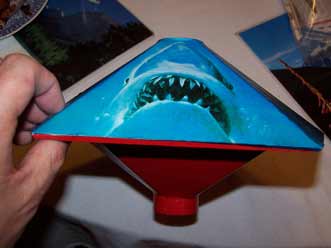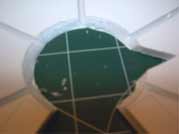| Construction Rating: | starstarstarstarstar_border |
| Flight Rating: | starstarstarstarstar |
| Overall Rating: | starstarstarstarstar |
| Manufacturer: | Art Applewhite Rockets  |
 Brief:
Brief:
This is a simple 38mm high power saucer that incorporates an aerobrake recovery system. This was my Level 1 attempt. Since my club's field is fairly small, I wanted a high drag rocket that is hard to mess up. Naturally, I thought of Art Applewhite.
Construction:
The kit consisted of:
- 2 marked foamboard shrouds
- 2 glue strips
- 38mm motor mount tube.
 Also included was an easy to follow instruction sheet. The setup is basic but effective. Nothing else is needed. It should be noted that these kits have the needed grooves precut in them to aid in folding. This is a blessing. I suspect doing it one's self would prove VERY tedious and probably not result in as good a job.
Also included was an easy to follow instruction sheet. The setup is basic but effective. Nothing else is needed. It should be noted that these kits have the needed grooves precut in them to aid in folding. This is a blessing. I suspect doing it one's self would prove VERY tedious and probably not result in as good a job.
In a radical departure from most other rockets where construction does not start with the motor mount. Instead, it begins with cutting out the top surface of the rocket. This is done on pre-marked and pre-grooved foamboard with the use of a straightedge and a razor knife. The cuts should be made slowly, using multiple passes and fresh blades. I changed blades after every two lines which was probably overkill but resulted in good cuts. When the upper body was cut out, I carefully folded it into shape and everything fit perfectly.
 The lower body starts out in almost the same manner but there are two lines around the motor mount hole and outer body. The outermost of these lines would be plumb cut. When those are straight, the razor knife is used to bevel the edge of the foam back to the second line. CHANGE YOUR BLADE BEFORE DOING THIS. This is the part I most worried about but I learned that using a fresh blade every couple of cuts yielded good results.
The lower body starts out in almost the same manner but there are two lines around the motor mount hole and outer body. The outermost of these lines would be plumb cut. When those are straight, the razor knife is used to bevel the edge of the foam back to the second line. CHANGE YOUR BLADE BEFORE DOING THIS. This is the part I most worried about but I learned that using a fresh blade every couple of cuts yielded good results.
After the upper and lower bodies have been test fit, it is time to permanently fold them and glue their edged together. This is done using white glue and an overlap strip. I used some weights to hold everything in place as the glue set up.
 When the upper and lower bodies are formed, white glue is used to filled the grooves. When the glue has set up, its time to make a dry run and fit everything together. If anything needs to be sanded into shape, now is the time to do it.
When the upper and lower bodies are formed, white glue is used to filled the grooves. When the glue has set up, its time to make a dry run and fit everything together. If anything needs to be sanded into shape, now is the time to do it.
The 38mm motor tube is slipped into the upper body. The lower body is then slid into place and everything is checked for fit. If the bevel cut into the outer edges of the lower body do not fit flush against the upper surface, sandpaper is used to improve the fit. When everything fits, white glued is used to fix everything in place. Fillets of white glued are then used to reinforce all intersections. I would use the glue to seal the exposed foam edges of the rocket as well.
- PROS: easy high power build, no special tools, grooves in the foamboard are already cut.
- CONS: none
 Finishing:
Finishing:
Finishing on this rocket was done very gingerly even though it was still conducted in my patented ham-fisted style. The instruction warns about the dangers that spay solvents pose to foam and I took these warnings seriously. Unfortunately, every primer I tried on a piece of scrap attacked the foam. My solution was workable but took lots of time and paint.
I sealed the edges of all foam with white glue and gave a thin coating of the same glue to both surfaces of the rocket. It was a very light coating. I waited for the glue to dry and harden, then took out the Krylon® primer. I gave the rocket a total of about 12 coats, if you want to call them coats. Essentially, each pass was a very light dusting. The hope was that there would not be enough solvent to soak in and that the solvent would evaporate quickly. In time, the thin layers built up a more protective layer to insulate the foam underneath. It seemed to work. The process was done first on the bottom and then repeated on the top.
When the primer was dry, I masked the entire upper body and sprayed the lower body red. I used light coats but they were not excessively light. My supposition is that the primer idea worked because there were no problems.
For further finishing, I found a jpg of the famous Jaws image on the web. I then opened it in photoshop and resize it such that the shark image was maximized in the space of a single panel of the rocket. After that, I printed 5 copies on decal paper and applied the decals, one on each face. I used a razor to try and fit at the corners but my hand was not steady enough for a great job. I wound up using an aqua colored Sharpie to fill in the white spaces. The result is not very noticeable. A coating of Future Polish finished the rocket.
- PROS: no finishing is needed but it can be finished in any sort of wild pattern, limited only by the imagination
- CONS: none.
Construction Rating: 4 out of 5
 Flight:
Flight:
Any 38mm motor can be used. I used a reloadable Aerotech H73-JM because it gave the longest burn of the motors available to me and I like the smoke trail.
Assembling the reload was the only real problem. A lot of the pieces had a tight fit. Even so, with some judicious shaving and peeling, the motor was put together and inserted into the rocket. A twiggy igniter was used in preference to the provided igniter and the rocket was ready to go.
It ascended off the pad on a column of dense black smoke. It roared all the way, reached apogee and inverted and began to descend the way it was designed using aerobrake recovery. About a hundred feet up, the ejection charge deployed the moustache streamer to make the NAR people happy. There was a slight dent in one corner. Other than that, it worked fine and I am now a Level 1!
 Recovery:
Recovery:
Almost all of Art's rockets are designed to use aerobrake recovery. This one is no exception. Since it is so dependable, some people higher up the food chain in the NAR and TRA object to its use for certification flights. Accordingly, new rules have been promulgated requiring active recovery.
To meet this requirement, an additional 38mm tube was added to the front of the rocket bearing a fiberglass streamer. This is called the moustache. It deploys as streamer, works well, is absolutely unnecessary and looks bloody silly. The one I have has a picture of the Mona Lisa on it. Sitting on top of the Jaws themed rocket, it is easy to see why Mona Lisa lost her smile. I will not be using the moustache again.
For what it is worth, if the idea is to make certification complicated, why are single use motors allowed?
Flight Rating: 5 out of 5
Summary:
This is a great HPR for small fields. It is easy to build and easy to recover. That makes it dependable.
Overall Rating: 5 out of 5
Other Reviews
- Art Applewhite Rockets Cinco 38mm By Donald Besaw Jr (September 10, 2007)
The Art Applewhite 38mm Cinco is a five sided pentagon shaped flying saucer with a 38mm motor mount. Like all other Art Applewhite saucers, this one is recovered using Art's aerobrake recovery. This kit came in one of Art's heat sealed thick plastic bags and included the following components: 1 foamboard top 1 foamboard bottom 2 cardboard seams 1 6 inch long 38mm motor mount ...
 |
 |
Flights
Sponsored Ads
 |
 |




![Calling Marshall Applewhite [Explicit] Calling Marshall Applewhite [Explicit]](https://m.media-amazon.com/images/I/51MeUaBWTkL._SL500_.jpg)





